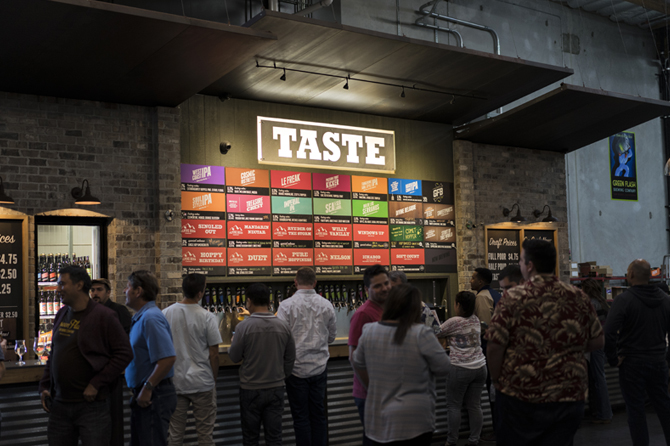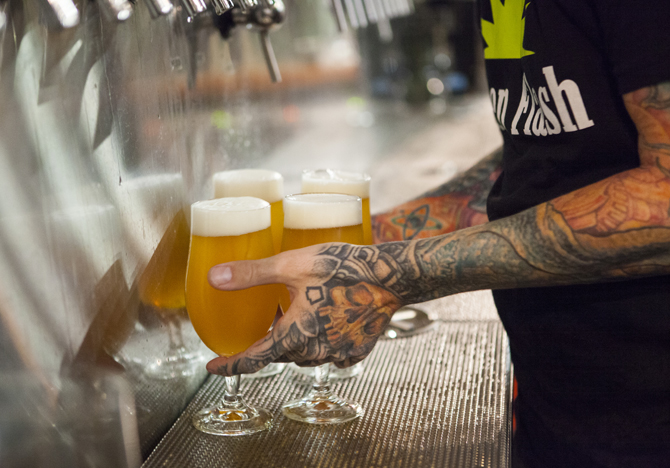
Green Flash Brewing Co. announced plans today to open a third brewery — this time in the Midwest.
The San Diego-headquartered company has acquired a 10,000 sq. ft., 10,000-barrel production facility with a tasting room and restaurant in Lincoln, Nebraska. The facility is the former home to Ploughshare Brewing Company, which closed on July 3 after about three years in business. Terms of the deal were not disclosed.
The announcement comes less than a year after Green Flash opened an East Coast brewing facility and taproom in Virginia Beach, Virginia.
Green Flash co-founder Mike Hinkley told Brewbound that the Nebraska facility could be open to the public within 90 days.
Green Flash, the 37th largest domestic craft brewery as defined by the Brewers Association (BA), plans to brew its beers at the facility as well as those of Alpine Beer Company, a San Diego-area craft brewery that Green Flash acquired in November 2014. Brewmaster Erik Jensen will oversee the direction of the brewery, as he currently does with the San Diego and Virginia Beach operations.

The company will ship beer in-state as well as to surrounding territories once the facility is online. Hinkley said that will allow Green Flash to save on freight costs to the region while also giving the brand a presence “in our least customer-connected area.”
“Up to now, we sold about 40 percent of our beer in our home state, about a third of our beer on the East Coast — and that’s actually increasing faster and might be approaching 40 percent,” he said. “But in all of the big, wide-open spaces of the Midwest, we’ve sold very little beer at all. This will help us to compete in those areas.”
Since hiring Chris Ross to run the business’ day-to-day operations, Hinkley said he has “spent a lot of airline miles this year” searching for potential opportunities to grow Green Flash in new markets. Specifically, he has visited breweries and facilities “all over the Midwest.”
Hinkley told Brewbound that he “moved pretty quickly” once he realized Ploughshare’s assets were available, and the deal was completed in about a month.
In July, Ploughshare founder Matt Stinchfield told the Lincoln Journal Star that he decided to close his brewery because “the income was insufficient to manage the debt,” which had accumulated due to the brewery build-out running over budget.
“We controlled our business expenses very frugally,” he told the outlet, “so the only reason that the business wasn’t open is that sales were less than expected.”
According to a BA estimate, Ploughshare sold 558 barrels of beer in 2016.

For Green Flash’s part, the acquisition is part of the company’s goal of building a national brand.
“I know that sounds crazy these days, but we’re on a 100-year plan,” Hinkley said. “So the next time craft gets on big wave, we’ll still be here. But our method to being a national brand is to be local and regional in as many places as we possibly can over the next five years or so.”
Hinkley admitted that his search is far from over.
“As opportunities present themselves, we will take action,” he said. “To the extent that we find nice matchups to consolidate, we’ll pursue that. To the extent that facilities become available, we’ll do that too.”
Hinkley said he’s interested in expanding in states where craft market share is low and local breweries are still in the developmental stages. One possibility is the Southeast, he added.
“There’s a lot of wide-open space and a lot of possibility,” he said.
Green Flash sales increased 12 percent last year to 91,040 barrels of beer. Hinkley admitted that this year has so far been a “challenge” for the brand.
“I think we’re going to end the year up a little bit, but we’re pretty flat,” he said. “Close to market and in our home states, we’re doing really well. In markets where we’re adequately represented, we’re doing well. But there’s a lot of space in the country where we don’t have the representation that we need and we’re not able to invest in those markets the way that we should, we’re down.
“It’s our goal to continually be part of the growth in those states,” he continued, “and hopefully over the future make some moves like this acquisition and opening in Lincoln, Nebraska, in order to bolster those territories over long haul.”